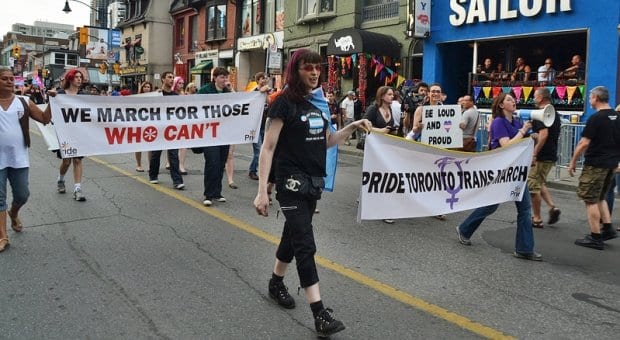Pride Toronto has officially cancelled its 2013 Trans March. Co-chair Francisco Alvarez says the board will instead organize a rally and throw its support behind trans activists who plan to march down Yonge Street on June 28 with or without a permit.
The decision comes after a fiery trans pride town hall, at which activists were told that the City of Toronto denied a permit for the march for the third year in a row.
“I think the anger is really justified,” Alvarez says. “[Trans folk] should have the same opportunities as any other part of our community to march. It’s regrettable what the City has decided. Hopefully public pressure may change their minds. We’ll just keep working towards that. Certainly we hope that in 2014 we can organize a march and it will be on Yonge Street.
“We heard the trans community tell us to not organize a competing march, and we are honouring that.”
Trans activist Nicki Ward, who is pleased with Pride’s decision, says plans are already in the works for a “renegade” march down Yonge Street on the Friday evening of Pride weekend.
“This is about freedom of assembly,” she says. “We don’t need permits.”
Ward says she wants 2013 to be the biggest trans march yet. “Pride estimates 500 people come to the trans march. Let’s get another zero on there. I want this year’s invitation to be sent to everyone to march in solidarity with us.”
For trans activists, marching on Yonge Street is more than symbolic, she says. The march is about trans people taking up space in non-queer spaces – places some trans people normally do not feel safe. “The message this sends to people outside Toronto is huge. There are many of us who live in isolation. Just walking a single block on Yonge Street speaks volumes.”
Alvarez says PT will have no hand in organizing the march, so as not to “contravene” the city’s decision. “What we are doing is holding a big Trans Pride rally. And if anyone wants to organize anything after that, that’s cool. Some of us may march in it, but it’s separate.”
Since 2009, when the Trans March began, the procession has marched down Church Street. But for the past two years, some activists have marched down Yonge Street, independent of PT. Many complain that the march on Church Street is “invisible” because it gets lost in the confusion of Pride festivities.
Ward says it’s important that activists keep pushing for a permit to make the march official. “I still think it would be a virtue to have the city engage with this process. Regardless, we are going to march on Yonge. But the question is, how engaged does the City of Toronto want to be?”
Councillor Kristyn Wong-Tam says the decision to deny the permit came from Toronto Police, who considered the cost to allocate officers to the event, as well as traffic, emergency services and TTC disruptions.
The denial of a permit for the Friday night march should not be viewed as an indicator of City support for Pride, she says. “Whether it’s the special events coordinators, waste management, emergency responders, we are out in full force, all weekend long, working around the clock with Pride Toronto to ensure the festival goes off in a way that is successful and safe.”
Still, says Wong-Tam, Pride has always been a political demonstration. And unlike the parade, there are no motorized floats in the trans march. “Take away the floats and it’s just people taking to the streets. It’s a political protest. And if that’s the case, you don’t need any permits.
“I’m a political activist. There’s no reason they can’t march. Take back the street. I would encourage that. I don’t think the community needs permission for that,” she says. “If us queers – and, obviously I include myself in that – had to wait for the government to acknowledge us, quite frankly, we’d be waiting for some time.”
Wong-Tam has marched in every Trans March, and says she will continue to do so.
Alvarez says he hopes the City may still reverse its decision. On behalf of the board, the co-chairs penned a letter to Toronto Police chief Bill Blair “to express disappointment and objection to the rejection” of a permit for Yonge Street.
“This year, as requested by trans community participants at two public town hall meetings, Pride Toronto has chosen not to organize a Trans March at all as a result of the request for Yonge Street being denied, but to use its resources to support an enhanced trans community rally,” the letter states.
Victor Kwong, Toronto Police media relations officer, says he’s looked into the matter and continues to get the same answer. “All of our resources for that entire weekend are spread very thin because it’s Canada Day throughout the entire city, and it’s Pride Weekend . . . It’s also because it’s the Friday night. The events on the Saturday and Sunday don’t have to deal with Friday night rush hour traffic from day-to-day Toronto.”
Kwong says when marches take place without a permit, officers must be pulled from other areas in the city in order to respond. “That’s a response situation,” he says. “All those cops that were called in unexpectedly were actually pulled from places the city that actually need to be policed.”
He says the decision has nothing to do with transphobia. “If the dyke march had asked for Friday night, they would have been denied. It’s just scheduling on that date.”
Pride Toronto to Toronto Police – Re: trans march on Yonge by Andrea Houston

 Why you can trust Xtra
Why you can trust Xtra


